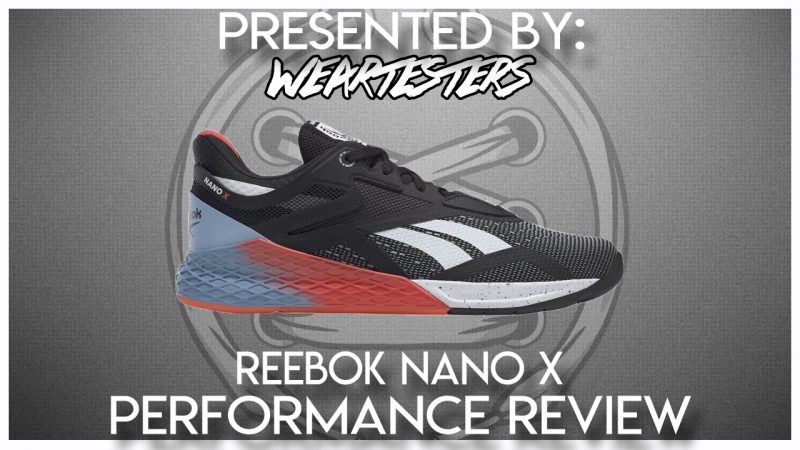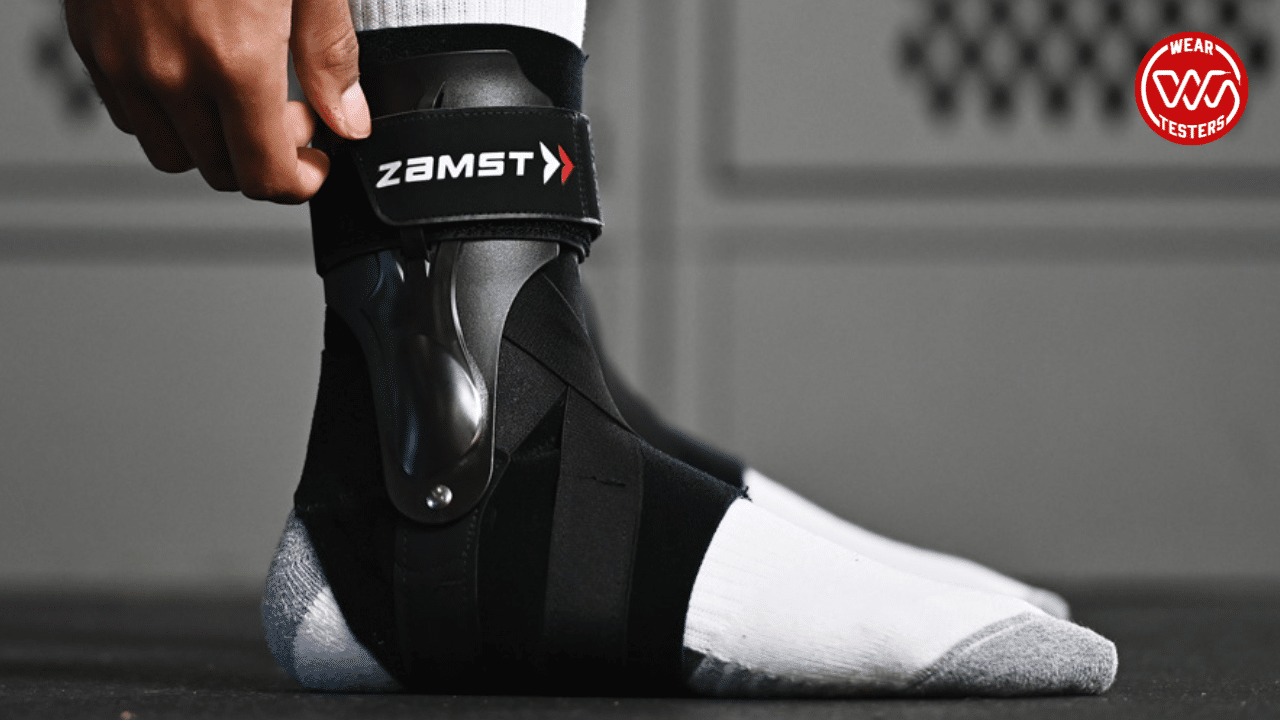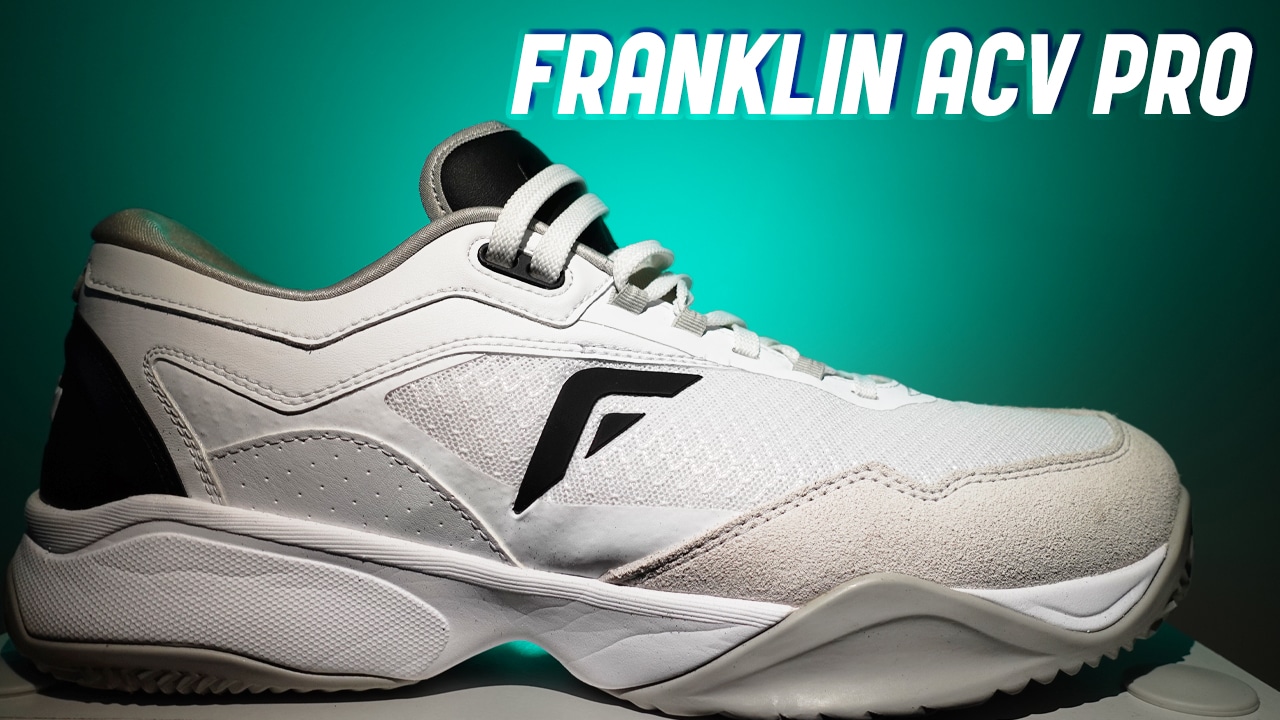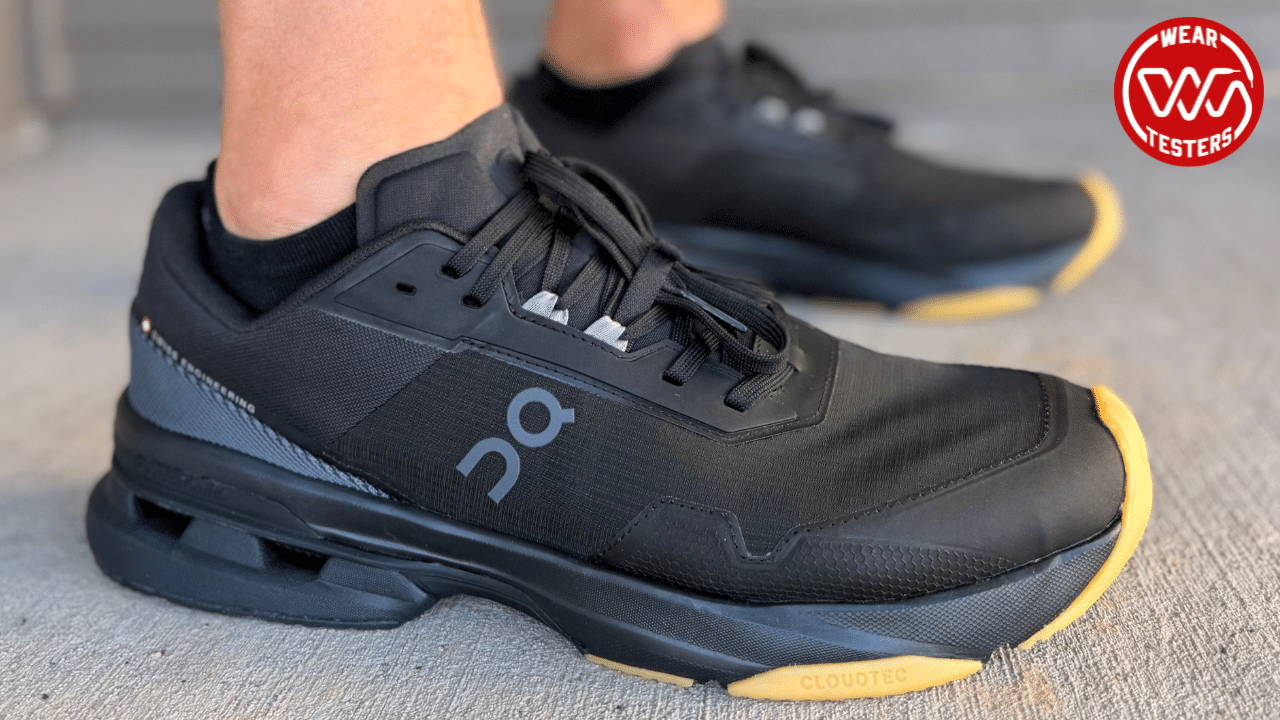10 years. It’s been 10 years since the rise of Crossfit and its Reebok Nano trainers. Over that time, Reebok has tried to fine-tune and develop materials and designs to improve rope climbs, box jumps, sprints, and the various lifts you see in gyms across the world. How close did they come with the Reebok Nano X? Only one way to find out. Read on, true believers…
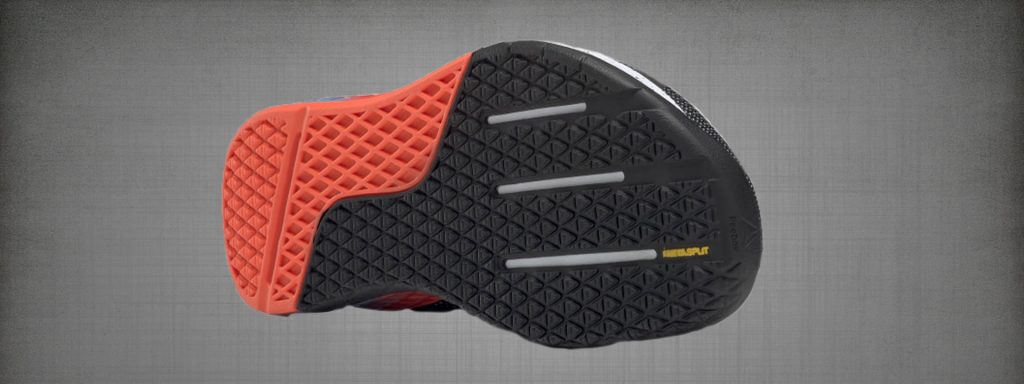
Traction
Bryan: The best place to start is usually at the bottom, and the Nano X traction is beautiful. An alternating diamond grid pattern mimics herringbone in basketball and completely covers the sole of the shoe. When I say “mimics herringbone” I mean it grips everything. I had no issues with wet concrete, wood floors, carpet on my box for jump training (20x24x30), or asphalt. I have been in quarantine the entire length of this review so my exercises have been a little limited (no rope climbs, no cleans, or squats) but the rubber has stood up to multiple short (2-3 mile) runs with no fraying and minimal wear. The rubber isn’t exactly thick (it has to be flexible) but the durometer (hardness) is more than a basketball shoe so it will wear slow.
Now, about the white areas you see – those are called the Metasplit and they are strategically-placed flex zones to allow the shoe to roll and splay with the foot while still providing grip in all activities and they work great. Any activity that requires your foot to grip (climbing, stairs, box jumps) is significantly easier with the splits. All in all, traction was a win.
Drew: Bryan is right, the traction is definitely a win. I was impressed with the tackiness of the dissected diamond patterns in the forefoot, medial midfoot, and heel. Despite being a hard rubber, the Nano X outsole was grippy on all surfaces. I found the traction especially helpful doing bodyweight exercises like planks or wall sits where you need the outsole to create friction and prevent slippage. No matter the exercise and no matter the weight you’re carrying, you won’t slip.
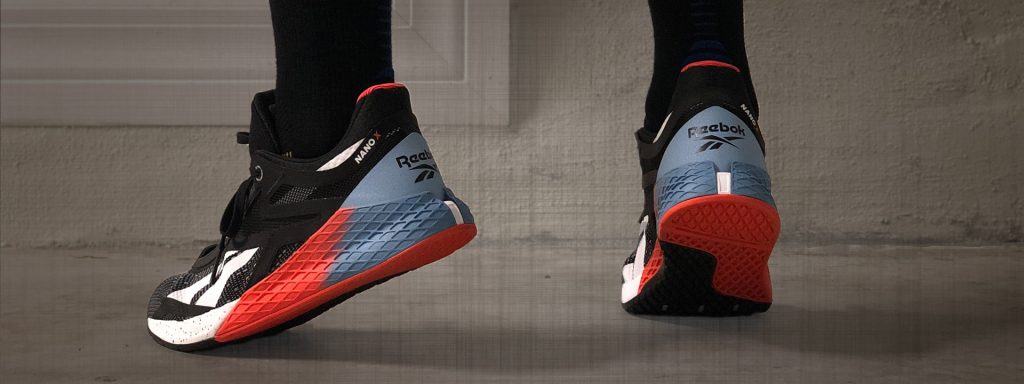
Cushioning
Bryan: Like most Crossfit/training shoes (except the Nike Zoom SuperRep), the cushioning in the Reebok Nano X is stiff and solid with very little compression. This makes for a great base for heavy lifts and landings from jumps but impact protection should suffer. Except… it didn’t. For some reason, for lifting and training, I have come to enjoy a cushioning that doesn’t provide a ton of impact protection. One reason is I tend to focus on form and function. If my form is correct and I am doing the lift/exercise correctly, I shouldn’t need much impact protection. The foam here was rumored to be Floatride, which made me happy, because Floatride is awesome, but Reebok decided to use standard EVA caged in the rubber midsole. The Nano X even worked for short runs, providing just enough protection that I didn’t feel much impact in my legs and back. I wouldn’t want to go much farther than 2-3 miles in them but less than that worked well. The caging in the heel keeps the foam from compressing and rolling over while lifting (which is more important than impact protection for this use case) but the forefoot being uncaged feels softer for jumps. All in all, a near-perfect setup for a training shoe.
Drew: There’s not much cushion. As Bryan mentioned, it’s just a thin layer of EVA. The EVA used is on the softer side but not too soft for it’s primary purpose, lifting weights and various workout movements. My only complaint is that the shoe was a bit slappy while running due to the stiff midfoot and high sidewalls. But I’m typically reviewing running shoes so I’m a bit spoiled in that department. But if you’re like Bryan and never skip leg day, you may be just fine.
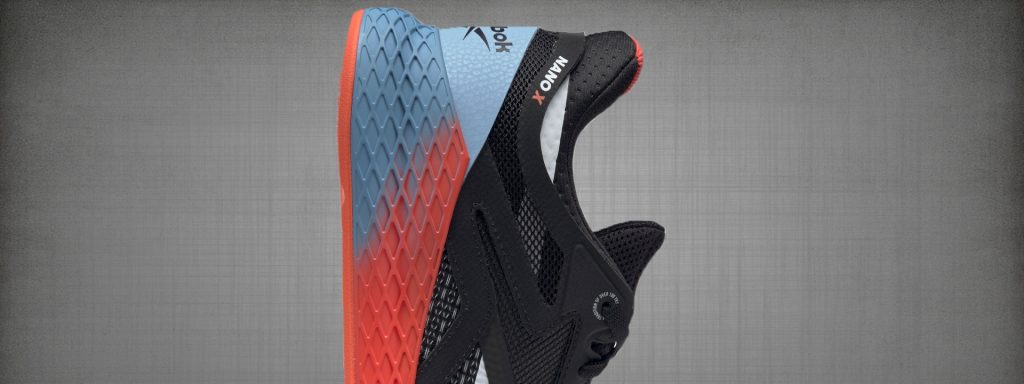
Materials
Bryan: Reebok goes back to the well with the tried and true Flexweave, first introduced in the Fast Flexweave runner three years ago. This material is not as soft as Flyknit, Primeknit, or Ultraknit, but is WAAAAY more durable. Nylon threads run through the textile upper from lateral to medial side, keeping the shoe laterally contained, while the sideways weave lets the forefoot flex more naturally. The inner bootie isn’t stretchy at all, adding to the containment factor, and the tongue is thin except for the upper part, where it turns into a thick padded treat. The Vector is painted on, which removes some weight and a layer of material. The lacing area does have a little fuse. Fairly simple but simple works.
Drew: The only thing I’ve got to add is that the upper part of the stretchy mesh tongue and it’s padded goodness was one of my favorite parts of the Nano X. The other impressively padded and comfy portion of the shoe was the heel collar. It’s filled with dense foam that feels great and helps with heel fit.
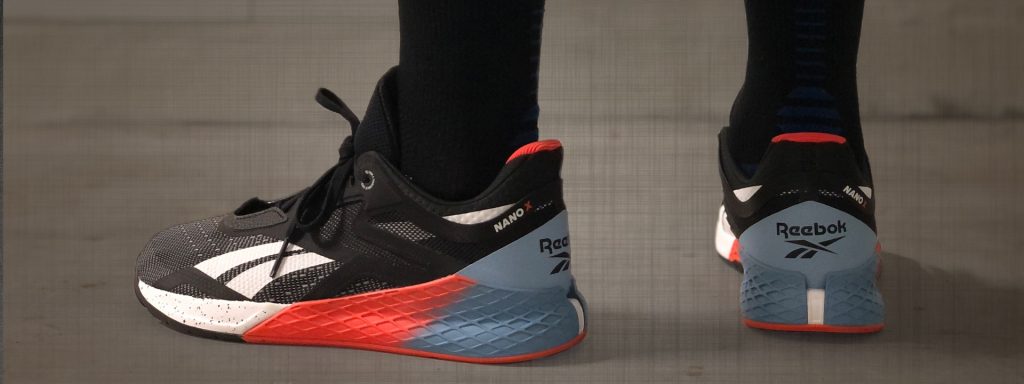
Fit
Bryan: Now the one category I have a hard time explaining on Crossfit/trainers (yeah, my words escape me, finally). The Nano series has utilized a wide, sort of squared toebox for a few models now and it’s nice for toe splay (when your toes land and spread out for grip) but leaves some serious dead space around the foot, especially over the top. This makes the shoe more flexible as you are lifting but also feels a little larger than needed. However, the length of the shoe is true to size so sizing down to take away the space is not my idea of a fun time. During lifts and activity, it works, but just wearing it feels big.
The midfoot is locked in using the straightforward lacing and the full-length internal sleeve, pulling the shoe up and around your foot. There are flex notches set into the lacing to help with flexibility and fit, and to help movements feel more natural. The heel is the true improvement. The higher cut on the heel and the added high-density foam collar ride your heel like a mountain ATV and the support cage layered over the sleeve pulls your heel back into the shoe. Very little heel slip (still some though) but not enough to feel unstable while wearing.
Drew: I didn’t get any heel slip and my heel and ankle area just sunk into the heel foam. I felt locked down inside a cage of memory foam. One item to note is the heel collar extends much higher than is normal for the Nano line. It’s not a big deal if you’re used to basketball shoes but if Chucks are your typical weightlifing jam, you may not love how high the rear collar goes.
As Bryan explained, the forefoot is wide. Not as wide as early Nanos but still supporting as much toe splay as you can give. The Nano X fits true to size. I’d encourage any narrow footers (like myself) to wear thicker socks like Strideline when working out in the Nano X.
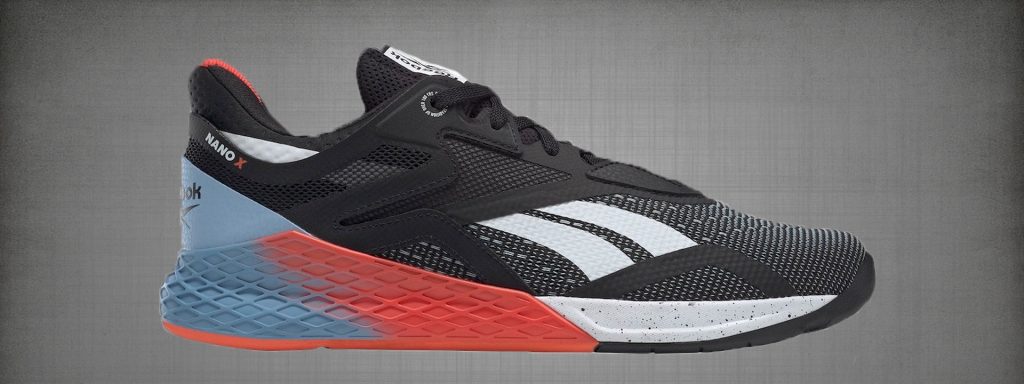
Support
Bryan: Like most good training shoes, support is a high point of the Reebok Nano X. The sole provides a solid, stable, WIDE base, and cages in the unstable foam without feeling too hard or rigid. The rubber caging raises up the sidewalls keeping the heel upright and also acts as the heel counter. The rubber cage also ties into the midfoot, making the rear of the shoe one piece under foot and as supportive as a Twitter lifecoach. The forefoot is also wide and stable, with a wider midsole around the lateral area to keep rollovers from happening. The medial forefoot is also rounded for ease of movement and better grip.
Drew: The flexweave is pretty strong all by itself but the sidewalls do most of the work. They extend above the midsole from heel to midfoot and keep you securely on the footbed during quick side to side movements. It’s a stable, grippy shoe.
The shoe’s platform is again relatively flat with the Nano X featuring a, typical for the Nano, 4mm drop. There’s no sliding forward as you lift heavy poundage up above your head.
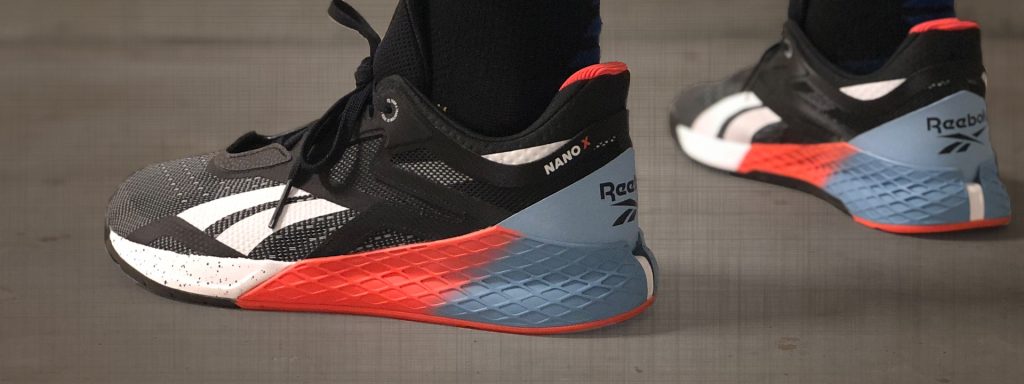
Overall
Bryan: The Reebok Nano X is a straight-up, serious training shoe, period. For anyone wanting a shoe for the weights, cardio machines, plyometrics, and short runs, there may not be a better shoe on the market (if there is, let me know). The combination of lightweight support, low profile cushioning, and good fit make the Nano X a shoe that does anything. Thankfully, Reebok kept the Vector logo, meaning it looks good on foot too. The only shoe I have in my closet that I can compare it to versatility-wise is the Lane Eight Trainer AD1. As many times as I have wished Reebok would get back in the basketball game, if they just keep making trainers like this, I won’t complain. I won’t say the Nano X is my favorite trainer ever (that’s still the Reebok JJ Watt II), but for anyone looking for an all-around shoe (I even played some driveway hoops in them) it gets no rougher.
Drew: The Reebok Nano X is the best Nano yet. It’s the most comfortable overall, including that plush heel, and not all that heavy at 12.9 ounces (Men’s 10). At $130, it’s a really good option for garage workouts while stuck in lockdown and for the gym when we finally get back to normal life.
Click here for current Reebok deals
Thanks to Reebok for sending pairs to test. Reebok was not given any editorial control of the review. This review is based on our weartesters’ experiences using the shoes for speed workouts, trail runs, treadmill training, long runs, casual wear, and more.

